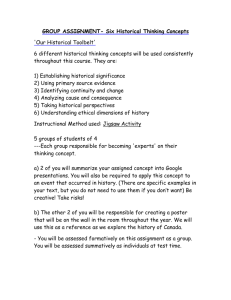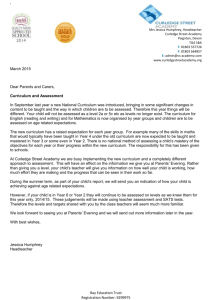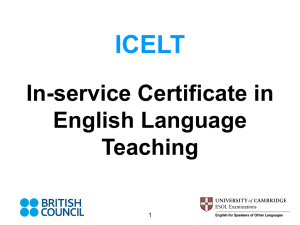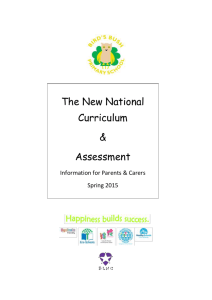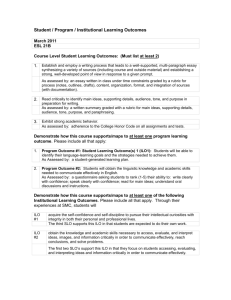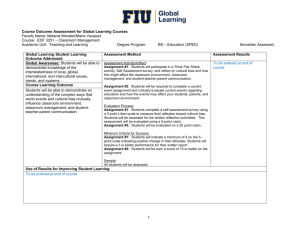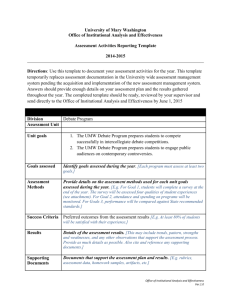Profiles All Subjects Template
advertisement
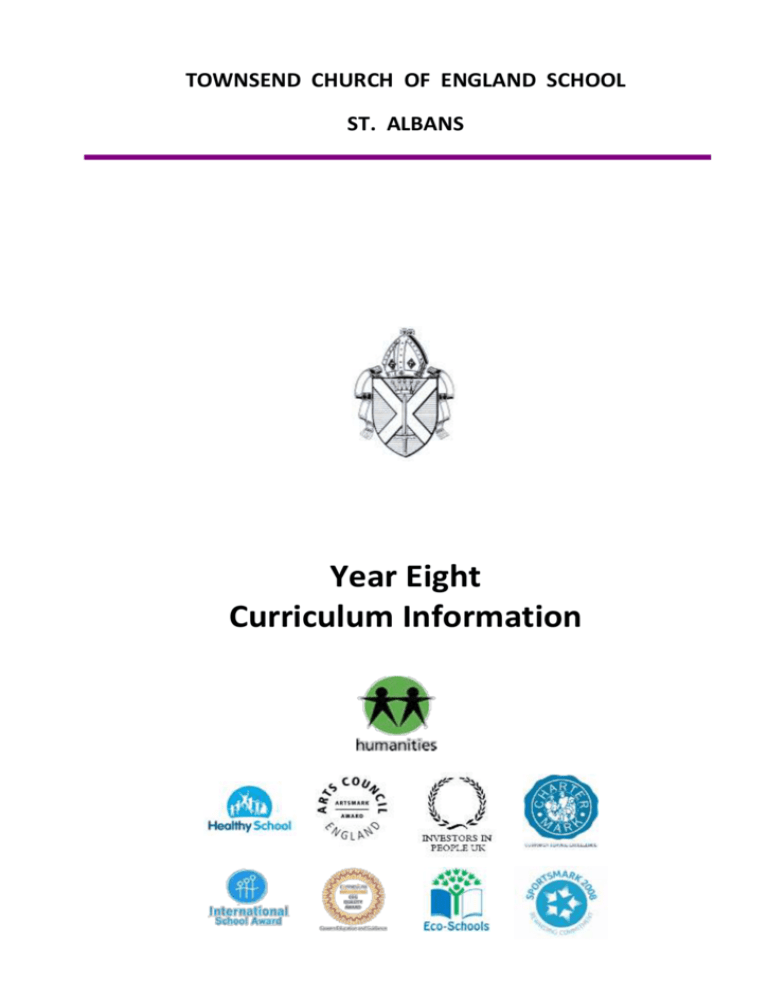
TOWNSEND CHURCH OF ENGLAND SCHOOL ST. ALBANS Year Eight Curriculum Information Key Stage 3 Curriculum Booklet 2014 This curriculum booklet outlines the course content for all subjects in your child’s year. It supports the Report that details your child’s progress across this academic year against their end of year Target Level. We have taken on board various feedback from parents/carers students and teachers and have tried to produce a more helpful and concise report that focuses on key areas of strength and development. The report is designed to show the progress a child has made over the year together with offering specific feedback with regards to future improvement. Working Levels are recorded as sub levels with ‘a’ being at the top of the level and ‘c’ the lower end. It is expected students will progress over at least two levels from Key Stage 2 and in many cases students will be challenged with three levels of progress. Students are being assessed throughout the year; in tests; in classwork and in homework. It is the culmination of all this Teacher Assessment that will provide the end of year Working Level. As students arrive in year 7, it is also worth noting that targets are already being set by the school for GCSE achievement. It is expected that students make 3 levels of progress from Key Stage 2 to GCSE but again in a number of cases students will be set a very challenging 4 levels of progress. Where a child should be achieving a minimum of a B grade we will be looking to see if an A or A* target is more appropriate and challenging. Students achieving a Level 4 at Key Stage 2 are expected to achieve a minimum Grade C, those achieving Level 5 are expected to gain a Grade B or above. Parents/carers should however be aware that Key Stage 2 levels cover a vast range of skills and subject content, so that a child achieving Level 4c is likely to be a very different ability to those who are achieving Level 4a. Each teacher has the initial responsibility of monitoring a child’s progress in his/her subject area. The Director of Learning for the subject area then has an overview and checks that assessments are moderated and valid and that appropriate intervention is implemented for those students identified as underachieving or not making sufficient progress. The Director of Learning for the Year group will also have an overview for each child in the cohort across all their subject areas to check progress is consistent in all curriculum areas. Where there is a concern, the teacher or Director of Learning should contact home and discuss ways forward with the parent/carer as promptly as possible so that the partnership between home and school can provide the necessary intervention for continued progress. In some cases you will be aware that the school has to manage the long term absence of a teacher through ill health or jury service for instance. In these cases the school will do their very best to provide the same standard of education for the children affected. This may involve using appropriate cover materials delivered by a Learning Supervisor, the use of external supply or a rearranged timetable where the school ensures there is at least some specialist teaching taking place with all classes each week. The school is always keen to seek the advice of parents/carers with regards to school improvement work. If you have any comments or suggestions in relation to any of the above information please do contact the school and speak to a Director of Learning or a Senior Teacher. We have attached a feedback sheet if you would rather complete this and send it in to the school office. We would like to thank you for your continued support and commitment to the school and appreciate that without this the students would not achieve the successes they do. Should you have any concerns or queries with your child’s Record of Achievement, please do contact the subject teacher or Director of Learning for that subject area. We have included a list of Directors of Learning below. ART AND DESIGN Year 8 have developed a variety of 2D and 3D work on various topics. Students have learnt about pattern, colour, shape and line, linking work with a range of artists. Students are assessed against Key Stage 3 criteria, using levels criteria to self and peer assess work. Teacher guidance is given using examples to develop further understanding of level descriptions. Teacher marking of key work throughout the scheme provides guidance and feedback for students so that work can be improved. DESIGN AND TECHNOLOGY The Design and Technology curriculum allows students to develop ideas in relation to a set brief and move on through the planning and making stages to create a final product. They will do this in food with a brief on the healthy feeding of an athlete, with a multi-cultural slant, and in product design with briefs on plastics and electronics. Students will also have experience of the use of a computer to aid designing. Levels achieved are assessed using the projects submitted at the end of each module. DRAMA The course covers a variety of topics including schemes of work on the Titanic and on Greek Mythology. The students learn how to perform detailed characters using different drama techniques. They also learn how to interpret a script for performance and develop the skills needed for a successful performance. Students strengthen their group work skills further through the writing and performing of topical scripts. At the end of every topic the students are assessed through teacher assessment and student self and peer evaluations. ENGLISH The English course includes work on a range of different forms of reading. These forms include information, explanation, description, narrative and persuasive texts. Speaking and listening activities are carried out in a range of contexts: paired work, group discussion and individual presentation. Formal assessment is by assignments within each unit of work. FRENCH In Year 8 students continue to use a range of everyday topics to practise understanding, speaking and writing their first foreign language. They are encouraged to find out about the people and culture of the countries whose language they are studying. Assessment in each of the four language skills (listening, speaking, reading and writing) takes place once each term; students also have vocabulary tests. The level finally awarded to a student at the end of the year is based on class work and homework, as well as on assessment test results. Level 4 is the target level for the majority of students at the end of year 8; the highest attainable level at this stage is 5. GEOGRAPHY The Key Stage 3 National Curriculum programme of study for Year 8 comprises; Climate Change, Weather and Climate, Medical Geography, Africa and Ecosystems. A core task or knowledge test is completed every half term. These include a weather enquiry, and a project on Africa. Other forms of assessment in the classroom include; answering questions, peer assessment, class discussion and homework HISTORY During Year 8 students study Britain from 1750 to 1900, through the themes of ordinary lives, Power and Democracy and Empires. Students will focus on some of the major turning points in history. Students are assessed through regular marking of exercise books and a series of assessments. In the classroom, peer and self assessment contribute to the students' learning and understanding of topics. INFORMATION COMMUNICATION TECHNOLOGY The students complete a series of units of work which cover web site design, programming, data handling, theory and modelling. The students work is continually assessed through informed observations, verbal questioning and some unit tests on special activities designed to judge progress. Each unit of work is awarded a level on completion. LEARNING FOR LIFE This course covers a variety of skills aimed at preparing students for life after school. Career development, personal social and health education and citizenship are all included within Learning for Life. Students work through a variety of topics aimed at developing their understanding and knowledge in these areas that will help benefit them in later life. Other topics covered in year 8 include; cultural diversity, emotional health and active citizenship. LEARNING SUPPORT Learning Support is a support option where students continue to follow the Tracks Literacy Programme for one lesson each week. Skills covered include; reading, comprehension, spelling, listening and speaking, writing and study skills. The personalised scheme of work continues from year 7 and aims to support each student in acquiring the key literacy skills needed to access the National Curriculum and beyond. Assessment is built into the Tracks programme, as students have to secure each stage before progressing to the next one. There is also ongoing monitoring of Write Words – the spellings that students have to learn for every lesson. MATHEMATICS In Year 8, students continue to expand and enhance their knowledge of number skills, measurement, algebra, and shape and space. They begin to explore more complicated geometrical figures and associated properties. They are set across the half-year. They are assessed regularly followed by an end-of-year examination in the summer term. MUSIC Students deepen and extend their own musical interests and skills throughout the year. They perform and compose music in different styles with increasing understanding. They work in pairs and individually on more in depth projects such as Chords I,II, IV,V and V, using chords in songs and Ground Bass and Variations. Students are assessed following the completion of each project. They are also involved in self and peer assessment through their class work. The levels students receive through Year 8 contribute to the final teacher assessment level at the end of Key Stage 3. PHYSICAL EDUCATION The physical education curriculum allows students to experience practical participation in the following activity areas: athletics, dance, fitness, games, gymnastics and swimming. Students continue to develop the skills and techniques required in each activity and apply them in competitive games and events. All students participate in inter-form competitions in several activities, aiming to achieve consistency in their performance in each of the sports. They begin to understand how analysing and evaluating a performance can lead to an improvement in technique, and students learn more about the rules and structure of different activities. Key fitness terms are introduced and explained, as well as basic human anatomy. Students are assessed in each activity in accordance with national guidelines for physical education. RELIGIOUS EDUCATION Students follow an introductory course on the person of Jesus his life and Christian beliefs into practise. They then go on to study the work of famous Christians and their influence on society. The year continues with a study of the life of the Prophet Mohammed and Islamic beliefs and practises. The Summer term includes a study into Buddhism and the life of the Buddha. Each term, the level at which students are working is assessed in accordance with the Hertfordshire Agreed Syllabus for Religious Education. SCIENCE In Year 8 students continue with the broad and balanced study of the three sciences they began in Year 7. They build on the knowledge gained and develop this by revisiting some topics in greater depth or applying the principles learned to new areas of study. Students will again cover twelve topics throughout the year, which consists of: Life Support, Keeping Healthy, People and Environment, Shaping Life, The Periodic Table, Using Elements, Metal Reactions, What’s in rocks?, Heating and Cooling, Light, Sound, and Moving Around, equally split between physics, chemistry and biology. Each topic is assessed when it is completed with assessments taking various forms from traditional tests to teacher assessed extended writing tests. Practical activities still form a major part of the course and students continue to build on their scientific investigation skills in a safe and appropriate manner.

